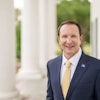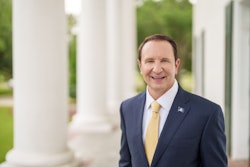Officials at New York’s City College are undertaking a mission to increase diversity in the field of public service by introducing plans for a national center and creating a new academic curriculum.
The Board of Trustees at the City University of New York (CUNY) recently approved the naming of the Charles B. Rangel Center for Public Service, which will be housed adjacent to the City College campus.
Named after U.S. Rep. Charles B. Rangel — the powerful chairman of the Committee on Ways and Means and a founding member and former chairman of the Congressional Black Caucus — , the center’s primary mission is to become a national hub for the advancement of diversity within the field of public service, says Dr. Brett Silverstein, who is the current director of the center and the college’s dean of social sciences.
College officials say that the Rangel Center will serve as a valuable locale for future recruitment and academic events and programs that are designed to attract students from underserved and underrepresented backgrounds and propel them toward leadership positions in government and public service.
According to a 2003 report issued by the U.S. Equal Employment Opportunity Commission, non-Whites occupy just 13.8 percent of top managerial and supervisory policy-making positions in the U.S. federal government, adds Silverstein. Increasing diversity among the public service work force, he says, is an essential ingredient for a properly functioning government.
“I think there is a general feeling that in a democracy it is useful if the
various populations of the people of that democracy have representation in the government,” he says. “We think of it (the center) as access to excellence … as a way to level the playing field.”
Construction of the center in Harlem will take place over the next few years after funding is secured. The blueprint for the center includes a specialized library, conference space and offices for visiting scholars, officials say.
Nevertheless, several specialized academic programs that are designed to complement the Rangel Center and its mission are set to begin soon. For example, officials are preparing to recruit and enroll students in a new master’s program in public service. This program will incorporate intensive academic seminars and mandatory internships that are arranged through the center. Silverstein says that the first incoming class is tentatively scheduled to begin the new graduate program this fall. A joint bachelor’s and master’s program in public service and a mid-career Rangel fellowship program in leadership and policy innovation are new additions to the college that will also complement the Rangel Center.
In addition to training and educating students about public policy issues that affect minority populations, the Rangel Center and its curriculum will incorporate studies relating to race, gender, ethnicity, class, immigration and various cultural influences that may impact the policy-making process, says Silverstein. College officials also have plans to sponsor internship and mentorship opportunities for participating students.
George Dalley, Rangel’s chief of staff, says the center is part of the Harlem Congressman’s long-term commitment to increasing the number of minorities who participate in various levels of government.
Rangel “is hoping that by training more young minorities … he can perhaps increase the flow of minorities into public service and help make the number more representative of our society and of the primary beneficiaries of government programs,” says Dalley, who adds that Rangel is particularly proud of the center’s future historic Harlem location. “He believes that part of the educational system is to make people aware of options … he wants to be a part of giving people the exposure of what it would be like to have a career in public service.”
Silverstein notes that he envisions the center becoming a resource for other programs and institutions across the nation that need information on how to educate public service students in issues relating to poverty, health and economics.
“In addition, we want to make sure that the center is not just helping our own programs but we would like to do a survey of programs and possibly sponsor a conference where we share the best practices … for example, what works best to recruit people from an underserved population? What works to help them graduate? We want to be the place that collects that information,” he says.
In a recent statement, Dr. Gregory H. Williams, president of The City College, notes that the Rangel Center and its initiatives will serve as a landmark for the college, the Harlem community and the country.
“Congressman Rangel has been an extraordinary public servant — both to his constituents and to the United States — his entire adult life. He is a wonderful role model for our students. The center honors his work on behalf of all Americans and preserves and extends his legacy,” he says.
Click here to post and read comments
© Copyright 2005 by DiverseEducation.com


















